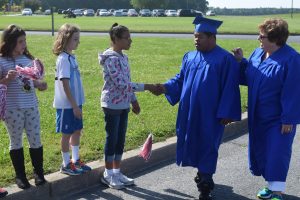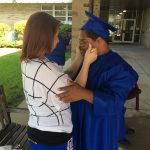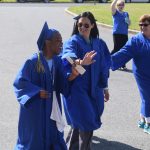
SNOW HILL — Tiffany Taylor admits she will be crying a lot over the next few weeks, but says her tears are endless tears of joy.
Taylor watched as her son, Hunter Schoolfield, donned a blue cap and gown and took a ceremonial victory lap through the parking lot of the Cedar Chapel Special School (CCSS) in Snow Hill on Wednesday morning. The sidewalks were lined with dozens of elementary and middle school kids from nearby public schools cheering and high-fiving Hunter as he trotted slowly, savoring each and every congratulatory high-five.
Although the official graduation for Cedar Chapel’s two graduating seniors isn’t until June 2, this day was a special prelude to the remarkable academic achievement of Hunter Schoolfield and his classmate and fellow graduating senior, Raihiem Smith.
“This is such an amazing school,” said Taylor. “I couldn’t imagine sending Hunter anywhere else. Worcester County is really lucky to have a school like this.”
Hunter Schoolfield was born with Down’s Syndrome, and at 21-years-old, is finishing a chapter of his life that started at Cedar Chapel Special School just before his third birthday.
Smith, also 21, lives with substantial learning disabilities but has an infectious smile and contagious laugh that was on full display as he posed for countless pictures with Schoolfield and many CCSS teachers and administrators.
“[Hunter] has been looking forward to this all year and knows this is a big deal, and that we will be going somewhere new,” said Taylor. “I know he’s excited to graduate but I know he will miss his friends.”
Belinda Gulyas, long-time principal at CCSS, says graduation is always full of emotion, excitement and a little bit of heartache.
“Our graduation is always very small, but it’s incredibly intimate,” said Gulyas. “These boys were definitely our big men on campus this year and they knew it. They took their sweet time going through that line of high-fives from the other students, and they deserve every moment of it.”
Wednesday marked the first time that the Cedar Chapel graduates participated in the graduation walk, which also included graduates from Snow Hill High School which is just a few blocks from CCSS.

Tiffany Taylor is pictured with her son, Hunter, in his graduation cap and gown. Photo by Bryan Russo
There are 55 students at CCSS from age 3-21. The teacher to student ratio is 2:5, as CCSS boasts a passionate and well-trained staff of teachers, aides, therapists and specialists challenge the students and help guide these students through the curriculum at the pace of what their special needs may demand.
“We really try to provide the whole spectrum of learning for our students,” said Guylas. “There are as many reasons as there are students as to why the students are here. The IEP (Individualized Education Program) team gets together and figures out what is the best place for specific children to get the schooling and instruction that they need.”
Taylor says her son has been through a number of surgeries in his lifetime since birth in addition to his learning disabilities, but has progressed immensely under the tutelage of his teachers at CCSS.
“They have helped him grow so much,” she said. “A lot of people look at him like he’s a challenge, but he’s my child and I never doubted anything that he would or could do, I just knew he would do it slower than the rest of the kids his age.”
Gulyas says the ability to have students at the school until age 21 provides important time for instruction in regards to what the student’s future will look like.
“It gives them a few years to do some vocational job training, if you will, so when they leave here, they will have had the opportunity to train for all kinds of different jobs to see what is really motivating and what they are really passionate about,” said Gulyas.
For most high school seniors, there is a definitive and traditional plan for what happens after graduation: some will enter a four-year university, while others may go to a community college or go right into the workforce. For a student with disabilities, the road is perhaps a little less travelled and much more uncertain. Yet, Gulyas says there are a lot of options.
“Our two graduates will be going to the Worcester County Developmental Center and continuing their education,” she said. “They will also be able for part of the day to be doing job training.”
In Annapolis, advocates have been pushing to get legislation passed that would end the longstanding practice of paying subminimum wages to people with disabilities in the state. In Maryland, the median income for a worker with a disability is just over $27,000 a year, while the median income for a worker without a disability is just over $40,000 annually.
According to the U.S. Census Bureau, approximately 145,000 individuals with a disability were employed in Maryland in 2014, and only half of them worked full time. Additionally, 24,400 individuals with a disability were unemployed, and 167,500 were not in the labor force.
That legislation, also known as the Ken Capone Equal Employment Act, passed through with bi-partisan support this session and makes Maryland the second U.S. state to eliminate this discriminatory exception to Section 14(c) of the Fair Labor Standards Act of 1938.
Gulyas says she has been fighting for years to champion inclusiveness for disabled children in schools and the workforce. CCSS practices “reverse inclusion” and Hunter, for example, spent some of his time at Cedar Chapel, and other parts of his day at Snow Hill High School and at Worcester Technical School.
He helped design the official CCSS graduation invitations, which are an impressive blue cap with a gold tassle.
“My whole life is about inclusiveness,” said Guylas. “If in any way, our children can be included in the most appropriate way, I believe we have to try and give them a chance. If it doesn’t work, we step back and regroup and try again, because from failure we learn.”
But for Hunter Schoolfield, Raiheim Smith, their families, and the inspiring staff of teachers and administrators at Cedar Chapel Special School, the coming weeks will be a celebration of the triumphs and the achievements of these two graduates. Yet, with each walking class of graduates at CCSS, it is also notable to acknowledge the community that helped them learn at their own pace so they could grow into the remarkable young people they have become.
The pomp and circumstance of graduation knows no disability, it praises ability and achievement, and it celebrates the turning of the page from one part of life’s journey to the next. It’s bittersweet, beautiful, and often creates boundless tears of pure joy.

